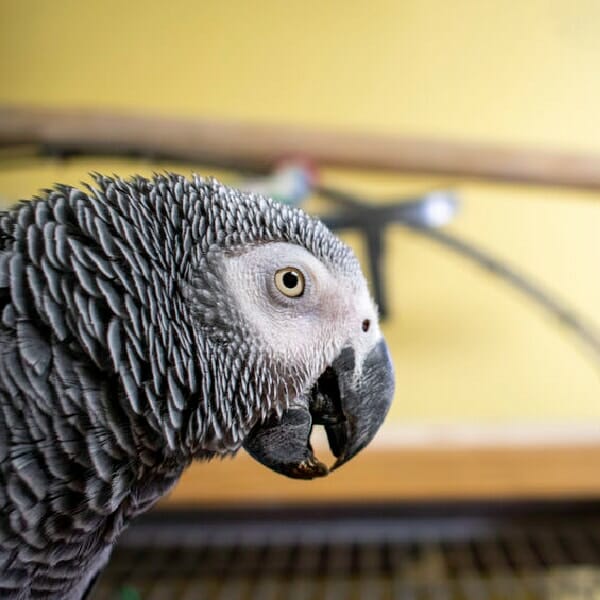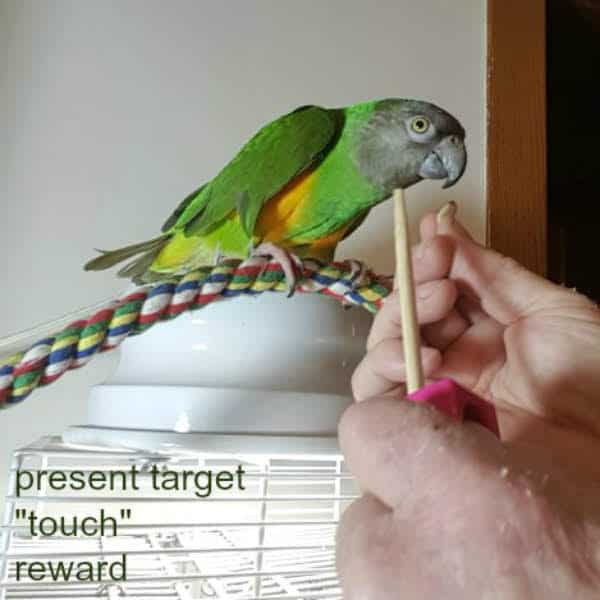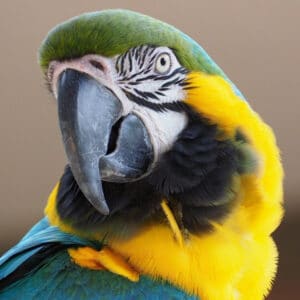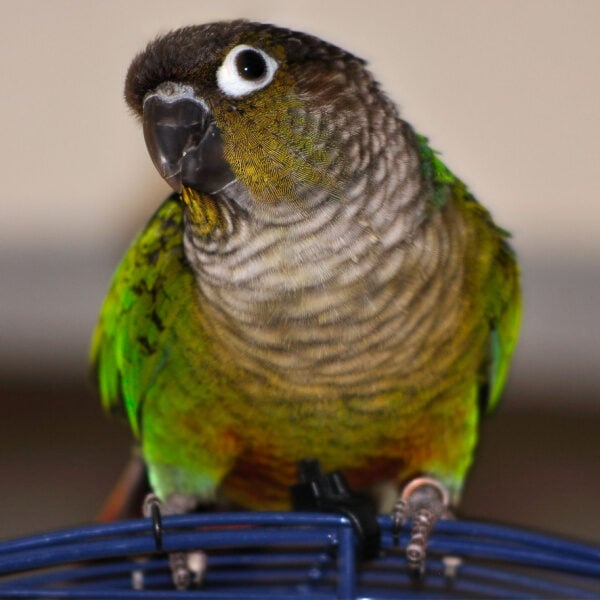Last Updated on by Mitch Rezman
Barbara S. doesn’t know what to do,
I have an African grey named Rocky who is 29 years old.
Over the last couple of years, he started to make these strange noises day and night out of nowhere.
So we took him to our aviary vet and after several visits and numerous tests, it was determined that it is a behavioral issue.
They explained that when he first started making the noise because I responded to Rocky with concern and babied him, that he knows that it got my attention, so he will continue to make the noises because that’s what gets my attention.
I have tried everything and anything that anyone has recommended with no luck and it’s been years.
We even thought that perhaps he is mimicking our snoring. Is there anything you can suggest or possibly take a look at a short video that shows exactly what he does? I need help desperately.
Dear Barbara
Yes, your vet is correct.
Your very smart bird noticed that you were responsive to the sound he mimicked and being a grey, he could do it so well.
This is common for greys to copy sounds they make and most grey owners find it charming even if it gets annoying like making the sounds of the microwave, alarm clock, or telephone ring.
Even your remote control clicker.
All you can do is ignore the sound when he makes it in hopes it will eventually drop out of his vocabulary.
I recall many years ago I was traveling to a bird show and had a baby lovebird that I was still weaning in a small carrier.
Well, that smart little bird figured out very early that if he rang a bell that hung in the carrier that I would turn my head and look at him.
That little guy would ring it and then look at me until I came to see him.
That is the same thing your grey is doing. Enjoy that he loves you and you are communicating.
Sure, send the video or recording to us. We would love to hear it.
We just don’t want you spending the rest of your life “answering the bird”.
Thank you soooo much for the response, Catherine!
Please see and listen to the 2 video clips of Rocky during the day as well as in the middle of the night when you have a chance.
We have learned to live with it but at times it is so unbearable that I cry because it literally happens ALL NIGHT LONG to the point that my husband and I have to wear earplugs to sleep and it’s been this way for years.
I now sleep on the couch and Rocky is in his sleeping cage upstairs with my husband at night.
It is very loud as well.
Sometimes it seems like he just needs to be snapped out of it like if he hears a noise in the middle of the night, he will stop for a little bit but not for long.
Any advice you can provide would be so greatly appreciated. We are willing to do or try anything and love him so much.
Thank you again!
Sounds Bobbie’s birds are making ~ Video
Dear Bobbi
We watched and listened. I recommend that you make NEW sounds to entice your bird to learn them.
Sounds Bobbie’s birds are making ~ Video 2
You and your husband can call out short sentences, phrases, and whistles as often as you can stand to do it.
Completely ignore the bird’s odd sounds, don’t react, don’t get up and leave the room, don’t look.
But in a short time (not too quickly), repeat one of your new words or whistle.
Respond to anything your bird says except the whine he is doing. Better yet, your husband should follow up and call the same back to you. This is how birds in a flock communicate.
Your bird is looking for ways to communicate with his flock and you will be giving him new ones to connect you.
Now, beyond this. I have a few questions.
The room is dark so I am unable to see the bird’s cage and furnishings.
I am assuming you took the pictures at night to show the sounds he makes.
Your bird is a plucker I see. How long has that been going on?
What toys and perches are in the cage? Can you send me pictures of the cage in better lighting? The stand(s) too.
Do you have supplemental lighting over the bird’s cage on a timer of 12 hours on during the day and 12 hours off at night?
Why Do Pet Bird Keepers Get The Lighting Thing Wrong?
This is very important for the bird to have bright daytime lighting.
I recommend a cover for the dark 12 hours. Not pitch-black darkness, just a light cover so he can’t see you and is forced to rest in his cage.
I also recommend that he be closed up inside the cage.
Unless he thrashes about, don’t peek and leave him until morning.
You can talk to him, but do not respond to his whines.
He should have a soft rope perch for sleeping placed up and in the rear of the cage.
The dowel perches should be removed and replaced with natural wood ones.
Single-ended bolt-on perches are best placed around like tree branches.
Please get back to me with more pictures (not videos) and answers to my questions. We would like to help you further if we can.
Regards,
Catherine
Author Profile
Latest entries
 Feeding Exotic BirdsDecember 29, 2025How to Switch or Convert Your Bird From Seeds to Pellets: Real-Life Case Studies and Practical Guidance
Feeding Exotic BirdsDecember 29, 2025How to Switch or Convert Your Bird From Seeds to Pellets: Real-Life Case Studies and Practical Guidance Feeding Exotic BirdsDecember 16, 2025A Practical, Budget-Smart Guide to Feeding Birds Well
Feeding Exotic BirdsDecember 16, 2025A Practical, Budget-Smart Guide to Feeding Birds Well Bird EnviornmentsDecember 7, 2025Understanding Budgie Cage Bar Orientation: Myths, Realities & Practical Solutions for Vertical-Bar Bird Cages
Bird EnviornmentsDecember 7, 2025Understanding Budgie Cage Bar Orientation: Myths, Realities & Practical Solutions for Vertical-Bar Bird Cages Feeding Exotic BirdsDecember 5, 2025How Dr. T.J. Lafeber Rewrote the Future of Pet Bird Nutrition
Feeding Exotic BirdsDecember 5, 2025How Dr. T.J. Lafeber Rewrote the Future of Pet Bird Nutrition




Lynne
4 Jul 2021I have lived with Grays for a long time, also, and their sound production can be amazing. The landline phone, my cell phone, the tv sign off sounds ( remember when they did that at one a.m.) the emergency broadcast alarm, my alarm system, the fire alarm, the microwave (often,that means dinner)any number of other avian species, and , of course, humans. The most amazing one for me, however, was when my young gray started “doing” my amazon.
I would be making dinner, and knew she was right there on her cage, yet, I could hear her in the living room. Whistling small snatches of tunrs works well with most grays, you just have to keep at it. With parrots, as with toddlers ( the closest thing to them) persistance and patience are the keys. I have a gray that whistles part of Fantasia, and the Star Spangled Banner. It replaced his loud call. He stills does a fair example of a sea-gull and an osprey when he wants to. I just peek at him and say,” Ah, Jonathon Livingston Parrot, I presume.” He has had his acknowledgement and goes on to something else.
Toys are another help in plucking and yelling ( this is somewhat like yelling). It’s messy, but cardboard keeps them so busy they really give up a lot of the more problematic activities. A clean box, the side of a box, attached with suita;ble string to the side of the cage. There are all kinds of inexpensive, fun things for them, but they have to have a lot to do. They are too intelligent to be left to just hang out in a cage. If he is with one of you, then that is his activity. Otherwise, give him safe, simple things to occupy his time.
As I write this, a 37 year old gray sits, burping behind me. He fell in love with the dog toys that make an appropriate sound when activated ( quack, bark, meow, gobble (the turkey)). But he couldn’t squeeze them with his beak, sufficiently to activate the soundbox. Pretty quickly he figured out that throwing them with gusto off his cage top did the trick .
Really, revel in the amazing qualities and just keep working on ways to keep him occupied.
Lynne